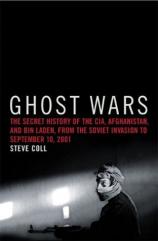Ghost Wars
Review
Ghost Wars
"Afghanistanism" used to be a derisive term in the newspaper world.
It meant playing up news from obscure far-off places while
neglecting what was going wrong on your own home turf.
No longer. Very few countries worldwide have been more important to
the U.S. over the past quarter century than this remote, primitive,
landlocked and little-understood area tucked in between Iran,
Pakistan and the former U.S.S.R. In this weighty and immensely
detailed book, Steve Coll, who reported from Afghanistan for the
Washington Post (where he is now managing editor) between
1989 and 1992, sorts out for the patient reader one of the most
complex diplomatic and military involvements the U.S. has
experienced in this century.
The cast of characters is immense, rivaling for sheer size (and
personal quirkiness) any novel by Dickens or Dostoyevsky. It ranges
from four U.S. Presidents through a platoon of bemedaled generals
from five or six countries and a regiment of scheming diplomats
down to hard-pressed pilots, miserably ill-equipped guerilla
fighters, steely-eyed assassins and suicide bombers. There are more
political factions here than most readers will be able to keep
track of --- not to mention the factions that spring up within
factions. It is all quite dizzying, but also fascinating and
important.
Coll is a conscientious reporter. He does his best to keep the
reader informed and to make his more important players come alive
as human beings. His book is not easy reading, but it rewards well
anyone who buckles down and stays with it to the end.
A couple of general impressions: First, Coll demonstrates time and
again how much of the really important things that government ---
any government --- does in foreign relations is done in deep
secrecy, far from the eyes and ears of the average consumer of
"news." Secondly, he leaves the impression that disdain and hatred
of non-Muslims is pretty much pervasive throughout the Muslim
world, coloring the actions and judgments even of those Muslims
whom westerners might not consider "extremists."
Another leitmotiv in this almost Wagnerian epic drama is a
pervasive lack of interest on the part of American policymakers in
the developing crisis in Afghanistan, followed by paralyzing
intra-agency squabbles and turf battles once the threat of
terrorism became unavoidable. One is reminded of Dickens's
satirical governmental invention, the "Circumlocution Office" in
Little Dorrit with its famous motto: How Not To Do It.
Coll covers in exhaustive detail the defeat and withdrawal of the
Soviet Union; the factional warfare that ensued; the rise of the
Taliban from a small cadre of student zealots to a force that ruled
most of the country; the emergence of Osama bin Laden; the clumsy
and ineffective efforts of the U.S. government to get meaningful
cooperation from Saudi Arabia and/or Pakistan in stabilizing and
democratizing the region; and the ominous events that led up to ---
but did not precisely signal -- the attacks of Sept. 11th. He is
especially good on the lack of interest and decisive action by the
U.S. after the Russian withdrawal and on the paralyzing rivalries
between competing governmental spook shops that caused this
breakdown. Action plans would be developed, only to be derailed by
fruitless internal debates and objections. "How Not To Do It"
indeed!
An additional strength of the book is Coll's knack for thumbnail
portraits of the participants. Most memorable are his word pictures
of two CIA directors: the religiously driven cold warrior William
Casey and the consummate organization man George Tenet. Also well
done are his portraits of Afghan warriors like the unlucky Ahmed
Shah Massoud (whose assassination closes the book) and Gulbuddin
Hekmatyar. Osama bin Laden himself, though dutifully described,
remains necessarily an offstage influence rather than a full-bodied
presence. Both Pakistan and Saudi Arabia come off in Coll's pages
as unreliable allies, to the point of being deceitful in their
dealings with the U.S.
GHOST WARS is not beach reading by any means, but those who have
the patience to get through it will emerge well informed indeed. Of
course, everything changed on the morning of Sept. 11, 2001. Can a
second volume be far behind?
Reviewed by Robert Finn (Robertfinn@aol.com) on January 22, 2011
Ghost Wars
- Publication Date: February 23, 2004
- Hardcover: 720 pages
- Publisher: Penguin Press HC, The
- ISBN-10: 1594200076
- ISBN-13: 9781594200076




